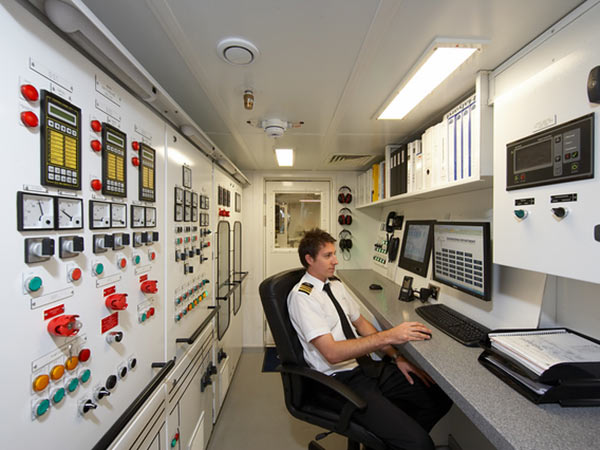Chief Engineer job description

The Chief Engineer is in charge of the engineering department and is responsible for its safe and efficient operation. He/she reports directly to the Captain. As well as managing the Engineers, Electricians and ETOs (Electronic Technical Officers), the Chief Engineer has overall responsibility for the engineering department.
The Chief Engineer is likely to get involved in the day-to-day work of maintaining the mechanical and electrical operations of the yacht, supervising the rest of the team and ensuring that all planned maintenance takes place. Additionally the Chief Engineer will coordinate operations with shore-side engineers. Many yachts have warranty and/or service contracts for all of the mechanical and electrical equipment and shore-side engineers undertake the vast majority of service and repair work.
A Chief Engineer must be a very technically-minded individual who can wear many hats during the course of the day. He/she must be able to transition well between engine room work and interacting with guests. The Chief Engineer will ultimately be responsible for keeping the mechanical side of the yacht running without a hitch. This is particularly the case with the Hotel Services elements of the yacht.
The Engineering department is responsible for just about everything on the yacht that could break and need to be fixed. This includes everything from the main engines to smaller pieces of equipment like jet skis, televisions, refrigerators, air conditioners, etc. The Chief Engineer must be able to trouble-shoot and repair virtually everything in the confines of the yacht. Additionally, they will have a good knowledge base of finding and purchasing parts for the yacht.
In smaller yachts it is not unusual for the Chief Engineer to be required to assist on deck particularly in docking, undocking and anchoring operations.
Required Skills and Experience
Most Chief Engineers have reached their position by starting out as an Engineer on board superyachts. They should have broad experience of maintaining and repairing all of the mechanical and electrical operations on board, including engines, generators, air conditioning systems, electrical systems and water makers. The Chief Engineer will be expert in preventative maintenance and troubleshooting and will have the ability to manage and supervise engine repairs, re-hauls and general upkeep in the Engine Room.
The Chief Engineer also needs the ability to manage and train subordinate staff in the engine room and should have a good knowledge of outsourcing contractors and shore based repairs when necessary.
Experience or an understanding of International Safety Management (ISM) or Mini ISM is required for many yachts.
Required Certification
The Chief Engineer should hold the MCA STCW Chief Engineer (Yachts) certification appropriate for the engine capacity, or Merchant Navy Second Engineer or Chief Engineer certification. In some larger yachts Merchant Navy certification is the required certification.
Salary Range
A Chief Engineer is likely to be paid between £2,500 and £4,500 per month, depending on experience and the size of yacht. On larger yachts with more engineering crew to supervise, the salary could rise to between £3,800 and £5,500 per month. In many of the larger yachts the salary scale may well be higher than this and there may be the opportunity for rotation.
Career Progression
Superyacht Crew
Experienced Chief Engineers will always be in demand, and progression usually leads to working on other, larger yachts.
Marine Industry
An experienced Chief Engineer would be in demand in a number of roles within the marine industry. Boatbuilding and shipbuilding firms employ Engineering Managers and Directors to head up their Engineering Teams, and Port Operations also require Engineers. It is also possible that your experience is relevant for Yacht Surveying work.
Other Industries
Engineering skills are valued in many other industries. Depending on the position, it may however be necessary to attend training courses or gain qualifications to convert your marine engineering skills to those relevant to the position.
